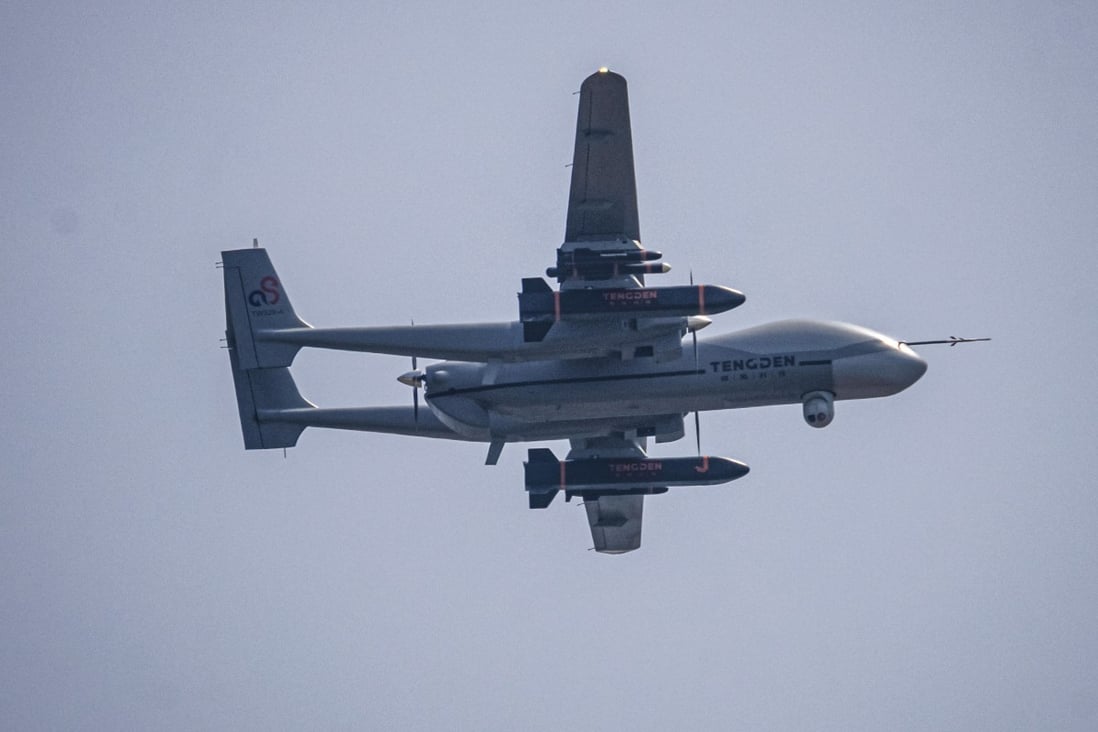Kristin Huang

Drones like the TB-001 could be used to attack helicopters and strike Taiwan’s smaller vessels during a conflict across the strait, according to a Chinese military magazine. Photo: EPA-EFE
A Chinese military magazine has highlighted the vital role drones would play in the event of a war across the Taiwan Strait.
It said drones could be used to “assassinate enemy leaders” and that their use could minimise casualties by shortening the conflict. They could also be used to target Taiwan’s mobile missile launchers and heavy weaponry.
The article in Ordnance Industry Science Technology outlines how a People’s Liberation Army attack on Taiwan might unfold.
After launching “the final unification war”, the PLA would seek to “suppress the island of Taiwan in all directions – land, sea, air, space, electricity and the internet”, according to the article.
It said drones would be key, noting their advantages over manned aircraft and other weapons systems.
“Manned combat aircraft can only stay in the air for a short time, usually three to four hours, which is completely different from the 30 to 40 hours of large and medium-sized drones,” it said.
Drones would also be the best way to attack smaller vessels, according to the article. “Long-endurance strike and reconnaissance drones like the GJ-2/11 and BZK-005C, TB-001 could carry out real-time surveillance and cooperate with attack helicopters to mount strikes against Taiwan’s smaller vessels.”
It also said with the deployment of WZ-7 high-altitude long-endurance reconnaissance drones, the PLA could extend a blockade of Taiwan to the second island chain. The strategic group of islands in the middle of the western Pacific Ocean includes Guam, where a US military base is located, some 2,700km (1,600 miles) from Taiwan.
In addition, the PLA’s attack and reconnaissance drones could target Taiwan’s mobile missile launchers and radar vehicles and destroy heavy weaponry like its Thunderbolt-2000, according to the article. The multiple launch rocket system was designed to fend off amphibious assault landing craft and other PLA warships during an attack.
A weekly curated round-up of social, political and economic stories from China and how they impact the world. GET THE NEWSLETTER
Mainland China and Taiwan split in 1949 at the end of a civil war when the Kuomintang was defeated by Communist Party forces and fled to Taipei. Beijing sees the island as part of China and has never ruled out the use of force to take control of it.
Oishee Majumdar, a specialist on unmanned systems and Asia-Pacific security analyst at Janes, noted that PLA drones were regularly entering Taiwan’s air defence identification zone “and it’s likely that such incursions will continue”.
“However, according to the information identified by Taiwan and Janes, most of these Chinese drones are conducting ISR operations – intelligence, surveillance, reconnaissance,” Majumdar said.
“For combat abilities, drones can indeed attack important military installations, disrupt military operations and affect civilian lives. But we don’t have evidence so far showing Chinese drones are capable of doing this.”
Majumdar also said Taiwan could be expected to develop counter-drone capabilities.
Tensions have been soaring across the Taiwan Strait since then-US House speaker Nancy Pelosi visited the self-ruled island in August, angering Beijing. The PLA responded with days of live-fire drills around Taiwan. It has continued to ramp up pressure on the island, with combat aircraft regularly sent into Taiwan’s air defence zone and further south over the Bashi Channel.
Combat drones have also been used in the PLA’s intimidation campaign. According to media reports, they include the TB-001 long-endurance strike and reconnaissance drone, the BZK-005 and BZK-007 long-range reconnaissance drones, the KVD-001 tactical reconnaissance and damage assessment drone, and the WZ-7 reconnaissance drone.
In September, Taiwan’s military shot down an unidentified civilian drone from mainland China – the first time Taiwanese forces have brought down a drone over territory controlled by Taipei.
No comments:
Post a Comment